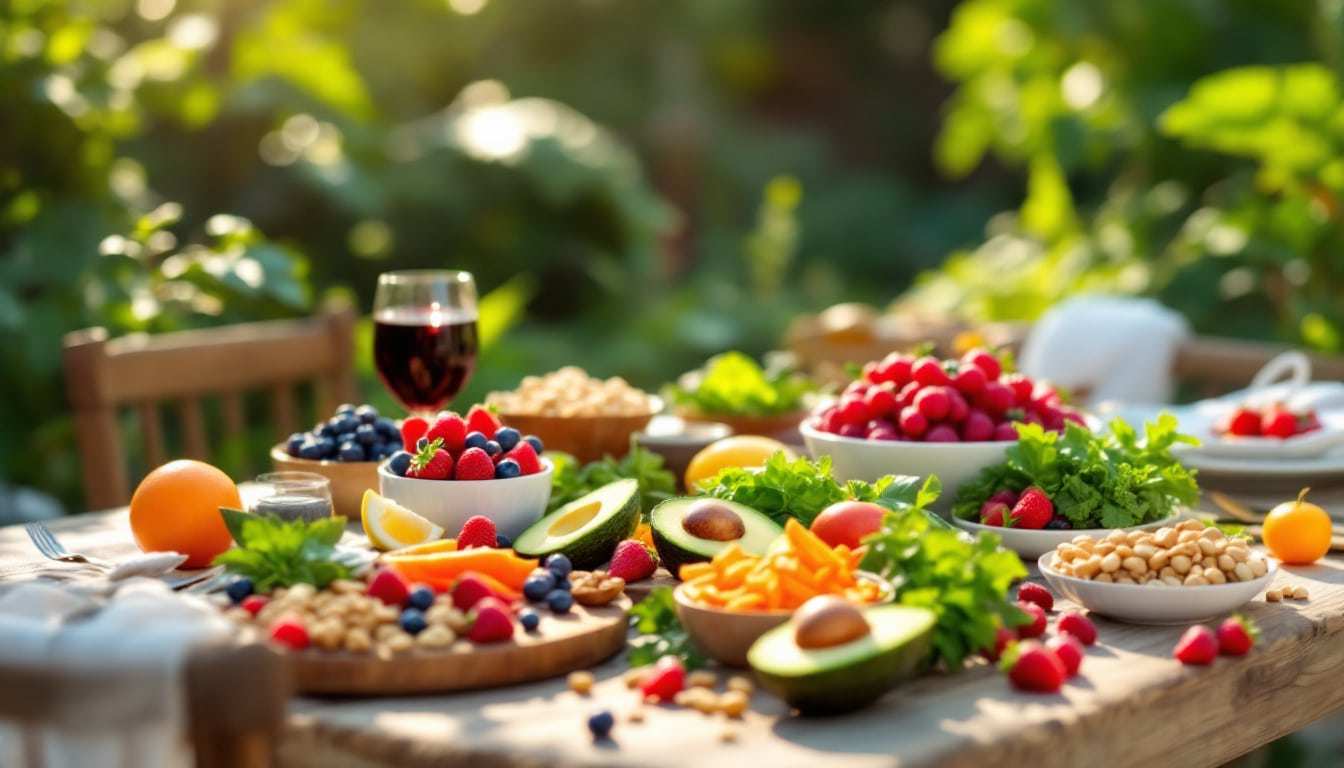Are you ready to unlock the secrets of youth? Anti-aging diets have gained significant attention, promising not just a reduction in the visible signs of aging but also an enhancement in overall health and vitality. With an ever-growing body of research dedicated to understanding our nutritional choices, various culinary approaches have emerged, each offering unique benefits to help mitigate the effects of time on our bodies. These diets focus on nourishing the skin, brain, and gut by incorporating antioxidant-rich foods, essential nutrients, and wholesome ingredients that support longevity.
Scientific studies indicate that some dietary alterations can play a pivotal role in extending lifespan and improving quality of life. By embracing whole, unprocessed foods and exploring the realm of biohacking, individuals can optimize their daily meals to bolster health and ward off age-related decline. From vibrant fruits and green leafy vegetables to healthy fats and lean proteins, the best anti-aging diets offer a treasure trove of options that are not only delicious but also life-enhancing. Let’s dive into the world of these remarkable dietary strategies and the profound impact they hold for our future health.

With the quest for longevity becoming more prevalent, many individuals are seeking effective ways to maintain their youthful vitality. Central to this pursuit is the role of anti-aging diets. These dietary approaches target the aging process by focusing on nutrient-dense foods that offer protective benefits against the deleterious effects of aging. This article delves into the scientific impact of some of the best anti-aging diets, drawing on recent research and engaging anecdotes that underscore their efficacy.
Table of Contents
ToggleUnderstanding the Science Behind Anti-Aging Diets
The concept of anti-aging diets is grounded in the understanding that what we consume has profound effects on both our longevity and overall health. Recent studies reveal that diets high in antioxidants and anti-inflammatory properties significantly extend life expectancy. The Mediterranean diet, rich in fruits, vegetables, whole grains, and healthy fats, is hailed for its ability to reduce the risk of chronic diseases associated with aging.
According to a study published in the journal Nutrition, Metabolism, and Cardiovascular Diseases, adherence to the Mediterranean diet resulted in a 20% reduction in all-cause mortality. This statistic highlights the importance of dietary choices in fostering long-term health. Furthermore, key anti-aging foods such as berries, dark chocolate, and green tea are packed with compounds that benefit not just the body, but also the mind. For instance, flavonoids found in dark chocolate have been shown to enhance cognitive function and combat oxidative stress.
Key Components of Effective Anti-Aging Diets
Several dietary components are crucial in establishing an effective anti-aging plan. First and foremost, a focus on whole, unprocessed foods is essential. Foods that are rich in vitamins, minerals, and other micronutrients play a significant role in preserving against age-related decline. Leafy green vegetables, for instance, provide a rich source of calcium and fiber, promoting overall digestive health and bone strength as we age.
Interestingly, a study published in Journal of Clinical Nutrition indicated that individuals consuming diets rich in leafy greens had significantly lower risks of dementia and cognitive decline. Further, incorporating healthy fats from sources like olive oil and avocado are pivotal in maintaining skin elasticity and moisture, two key indicators of youthful appearance.
Additionally, including protein sources like salmon, which is high in omega-3 fatty acids, can aid in muscle preservation and support heart health. Diets that incorporate sufficient protein help counterbalance the natural muscle wasting that occurs with age, a phenomenon known as sarcopenia. A study in the American Journal of Clinical Nutrition highlighted that higher protein intake leads to improved physical function among older adults.
The incorporation of spices such as turmeric can also yield catalytic benefits. Turmeric contains the compound curcumin, which exhibits strong anti-inflammatory properties. Incorporating curcumin into your daily diet, as a part of a balanced meal, can lead to reduced inflammation markers in the body, thus enhancing your overall well-being.
Furthermore, hydration plays a vital role. Staying properly hydrated is essential in maintaining skin integrity and vitality, as well as supporting optimal bodily functions. Water aids in nutrient transport and waste elimination, which are essential processes that influence aging.
In summary, focusing on a holistic approach to anti-aging diets that incorporates nutrient-dense foods, healthy fats, proteins, and spices while emphasizing hydration can lay the groundwork for a healthier future. For further exploration of dietary sciences, consider accessing resources like Harvard Pilgrim.
Recent Innovations in Anti-Aging Dietary Practices
Recent innovations in the realm of anti-aging diets extend beyond traditional foods. The field of biohacking has emerged, prompting individuals to experiment with various dietary regimens that promise to reverse aging signs. Among these innovative approaches is intermittent fasting, shown to promote autophagy—a process whereby the body cleanses itself of damaged cells.
Research from the Nature Metabolism Journal underscores how intermittent fasting can extend lifespan in animal models. Additionally, it has been correlated with enhanced insulin sensitivity and reduced risk of metabolic diseases. Implementing this method provides a dynamic approach to maintaining health and vitality, while promoting a rejuvenating effect on our cellular systems.
Another burgeoning trend involves evaluating the impact of micronutrients on aging. Studies published in the American Journal of Epidemiology suggest that specific vitamins, such as Vitamin D and Vitamin E, can have pronounced effects on longevity. These vitamins serve as antioxidants that combat oxidative stress and are crucial for maintaining mood, immunity, and cognitive function.
Individuals are also turning to personalized nutrition based on genetic profiling, allowing for more tailored diets that meet specific health needs. This approach leverages advancements in genetics to influence dietary choices targeted toward extending lifespan and optimizing health. For insights on this frontier, you can explore the implications of biotechnology in longevity, detailed in a piece on Upper Longevity.
Incorporating supplements to address nutrient gaps is another strategy gaining traction. As we age, the body’s ability to absorb nutrients diminishes, highlighting the importance of supplementing with high-quality vitamins and minerals. Studies indicate that certain supplements can enhance specific biological functions associated with aging, enabling individuals to maintain their vitality well into their golden years.
In conclusion, the landscape of anti-aging diets is ever-evolving, shaped by new research and innovations. By understanding the scientific impacts and integrating contemporary practices, individuals can effectively enhance their longevity and pave the way for a healthier, more vibrant life.

Frequently Asked Questions about the Best Anti-Aging Diets
What are the best anti-aging diets? The most effective anti-aging diets focus on whole, unprocessed foods, rich in antioxidants, healthy fats, and fiber. Examples include the Mediterranean diet, plant-based diets, and those high in fruits and vegetables.
How do these diets impact longevity? Research indicates that diets limiting certain nutrients may increase lifespan and reduce age-related diseases by promoting optimal metabolic functions and cellular repair.
What foods should I include in an anti-aging diet? Top choices for an anti-aging diet include berries, leafy greens, avocados, nuts, and salmon, all of which are known for their beneficial effects on skin, brain, and overall health.
Are there any foods to avoid for anti-aging? Yes, processed foods, high-sugar items, and those rich in unhealthy fats can accelerate aging processes and should be minimized in your diet.
What role does hydration play in anti-aging? Staying well-hydrated is crucial for maintaining skin elasticity and overall health, enhancing the body’s ability to detoxify and function effectively.
Can supplements enhance an anti-aging diet? Certain supplements like antioxidants, omega-3 fatty acids, and vitamin D can complement an anti-aging diet, providing additional support for health and longevity.
Is there a specific anti-aging diet for men or women? While both men and women can benefit from similar dietary guidelines, some studies suggest that women may experience different results from specific nutrient intake, emphasizing a tailored approach.
How can I start implementing anti-aging diet practices? Begin by incorporating more whole foods into your meals, such as fruits, vegetables, and whole grains, while reducing processed options and sugars.
What is the importance of antioxidants in an anti-aging diet? Antioxidants combat oxidative stress in the body, which is a significant contributor to aging, helping to protect cells and improve overall health.
Are there specific anti-aging diets backed by science? Yes, many anti-aging diets have scientific backing, including the Mediterranean diet, which emphasizes healthy fats, lean proteins, and plenty of vegetables, showing positive effects on longevity.





